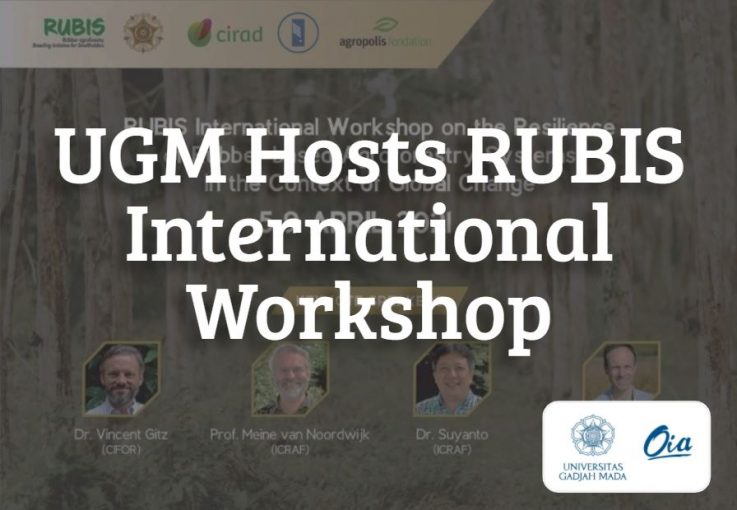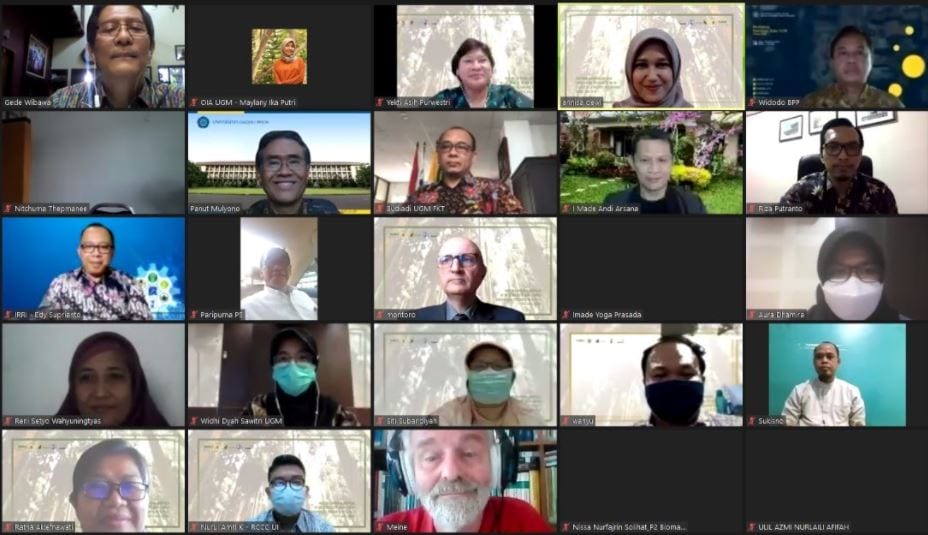
English
UGM Hosts RUBIS International Workshop on the Resilience of Rubber-based Agroforestry Systems in the Context of Global Change
The Research Center for Biotechnology at UGM hosted the first RUBIS International Workshop on the Resilience of Rubber-based Agroforestry Systems in the Context of Global Change on Monday (5/4). This workshop is a part of the RUBIS (Rubber Agroforestry Breeding Initiative for Smallholders) project held by the consortium of CIRAD (The French Agricultural Research Center for International Development), IRRI (the Indonesian Rubber Research Institute), and UGM.
While rubber is one of the strategic commodities of plantation crops for Indonesia, it has been facing threats to its rubber plantation systems and production. Indonesia is reported to contribute 28.6 percent of the world’s total natural rubber supply. However, low productivity has been one of the biggest challenges for rubber production, especially for smallholders. Threats posed by climate change are exacerbating this vulnerability of smallholder rubber plantations.
RUBIS project aims to mitigate these threats by introducing and mainstreaming agroforestry systems, which studies have shown to be resilient to climate change. The RUBIS International Workshop was held under five sub-themes: Agronomy of rubber-based agroforestry systems, socio-economy of rubber-based agroforestry systems, food crops in agroforestry systems, ecosystem services, and environmental issues, and food security and agroforestry systems.
This workshop is running for five days, from April 5th – 9th 2021. The participants are researchers who come from across the globe, such as France, Nigeria, Malaysia, Sri Lanka, India, UK, Singapore, the Netherlands, and Indonesia.
Rector of UGM, Prof. Ir. Panut Mulyono, M.Eng., D.Eng., IPU, ASEAN Eng., delivered his speech to mark the official start of the workshop. He hopes the workshop can contribute to establishing resilient rubber-based agroforestry systems (RAS) to maximize Indonesia’s rubber potentials. (Safira/OIA)
Bahasa
UGM Jadi Tuan Rumah RUBIS International Workshop on the Resilience of Rubber-based Agroforestry Systems in the Context of Global Change
Pusat Studi Bioteknologi UGM menjadi tuan rumah RUBIS International Workshop yang bertajuk “The Resilience of Rubber-based Agroforestry Systems in the Context of Global Change” pada Senin (5/4). Lokakarya ini merupakan bagian dari proyek RUBIS (Rubber Agroforestry Breeding Initiative for Smallholders) yang diadakan oleh konsorsium beranggotakan CIRAD (The French Agricultural Research Center for International Development), IRRI (the Indonesian Rubber Research Institute), dan UGM.
Di tengah fakta bahwa karet merupakan salah satu komoditas tanaman perkebunan strategis bagi Indonesia, sistem perkebunan dan produksinya tengah menghadapi ancaman. Menurut laporan, Indonesia berkontribusi sebesar 28.6 persen terhadap total pasokan karet di dunia. Namun demikian, produktivitas rendah merupakan salah satu dari tantangan terbesar bagi produksi karet, terutama bagi para petani kecil. Ancaman yang disebabkan oleh perubahan iklim memperparah kerentanan perkebunan karet milik petani kecil ini.
Proyek RUBIS bertujuan untuk memitigasi ancaman-ancaman ini dengan mengenalkan dan mengarusutamakan sistem agroforestri, yang mana studi telah menunjukkan ketahanannya terhadap perubahan iklim. RUBIS International Workshop mengangkat lima sub-tema: agronomi sistem agroforestri berbasis karet, aspek sosio-ekonomi dari sistem agroforestri berbasis karet, tanaman pangan dalam sistem agroforestri, jasa ekosistem dan isu lingkungan, serta ketahanan pangan dan sistem agroforestri.
Agenda lokakarya ini berlangsung pada tanggal 5 – 9 April 2021. Peserta merupakan para peneliti yang berasal dari berbagai negara, seperti Perancis, Nigeria, Malaysia, Sri Lanka, India, Inggris, Singapura, Belanda, dan Indonesia.
Rektor UGM, Prof. Ir. Panut Mulyono, M.Eng., D.Eng., IPU, ASEAN Eng., menyampaikan sambutan sekaligus secara resmi membuka lokakarya ini. Ia berharap lokakarya ini dapat berkontribusi dalam membangun sistem agroforestri berbasis karet (RAS) berketahanan untuk maksimalisasi potensi karet Indonesia. (Safira/OIA)


Recent Comments